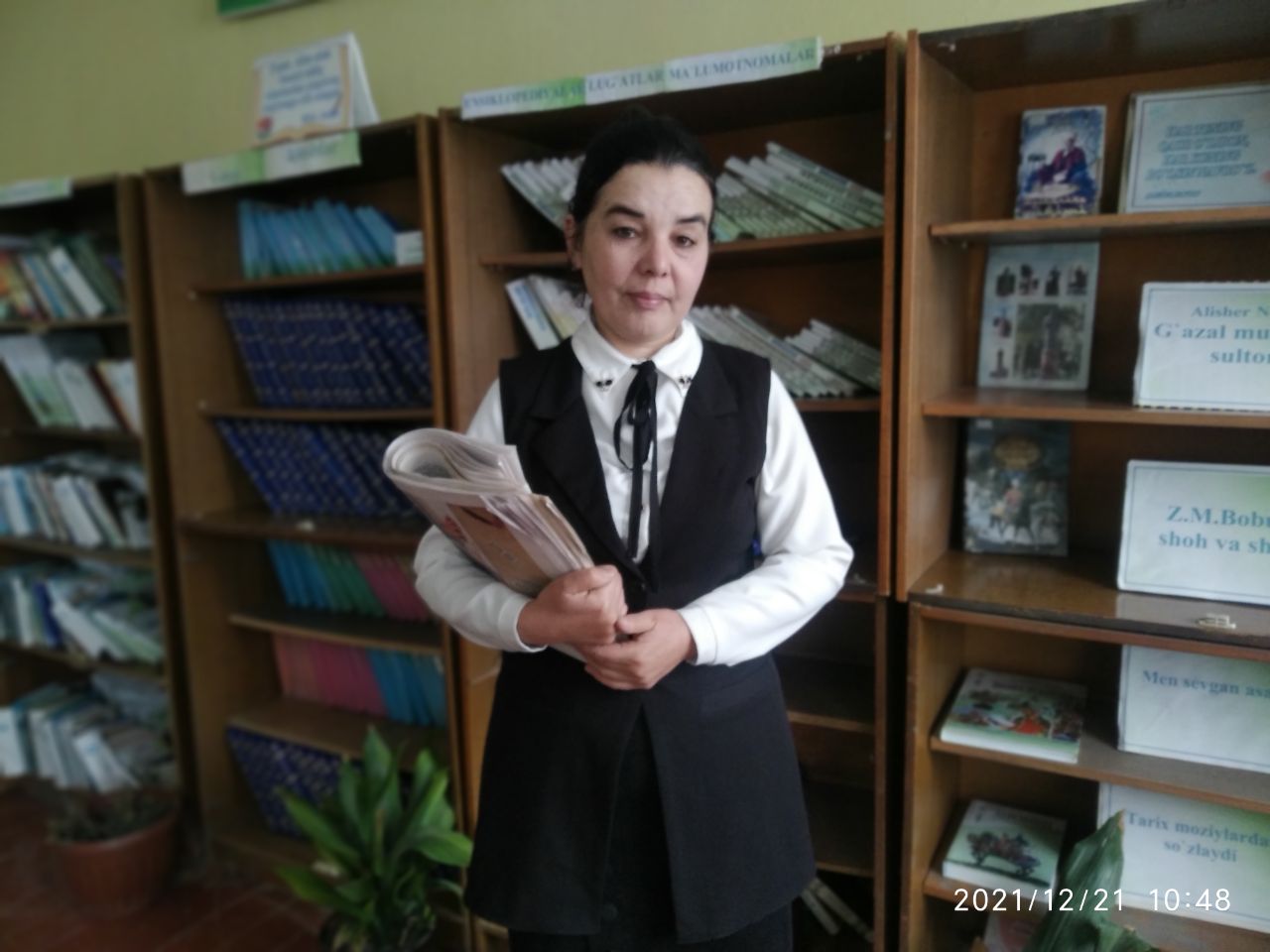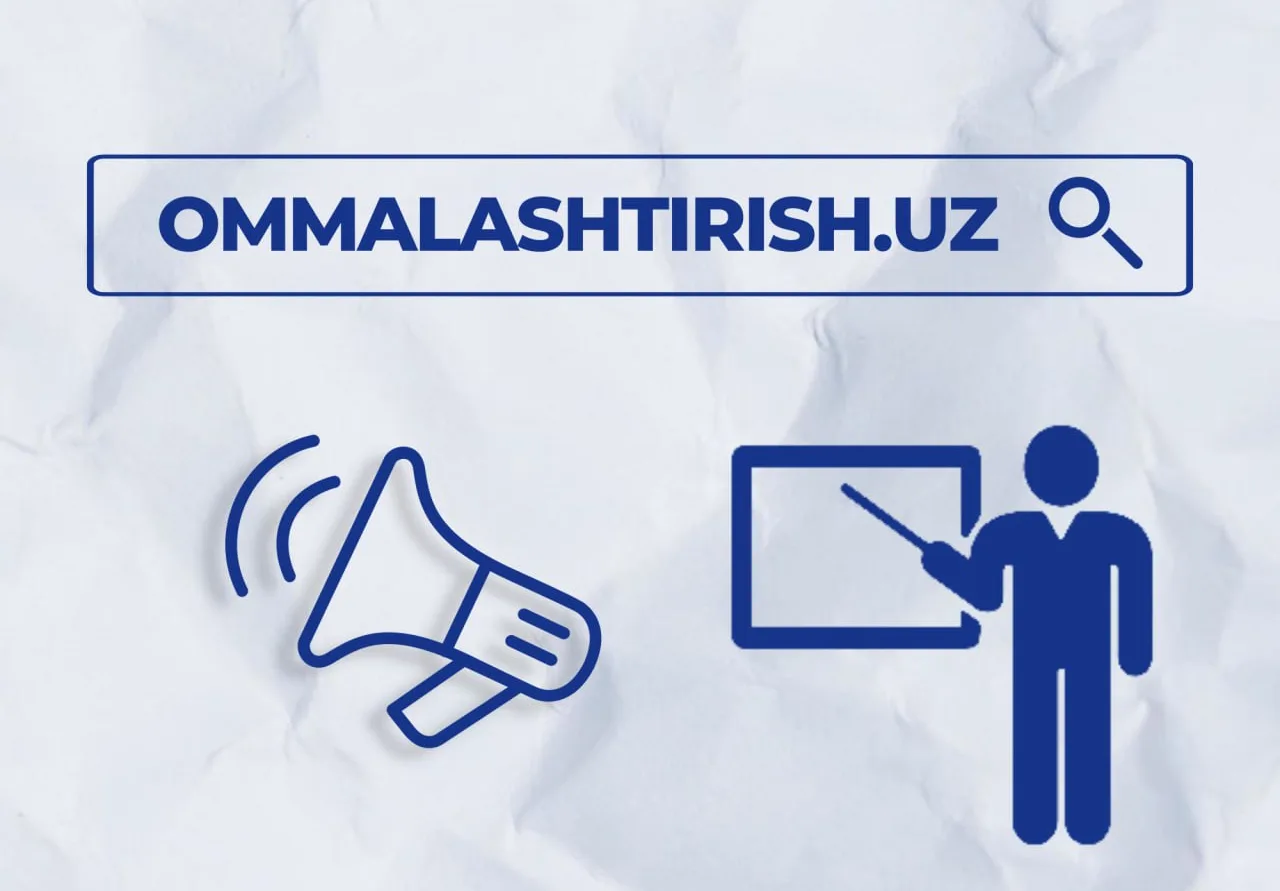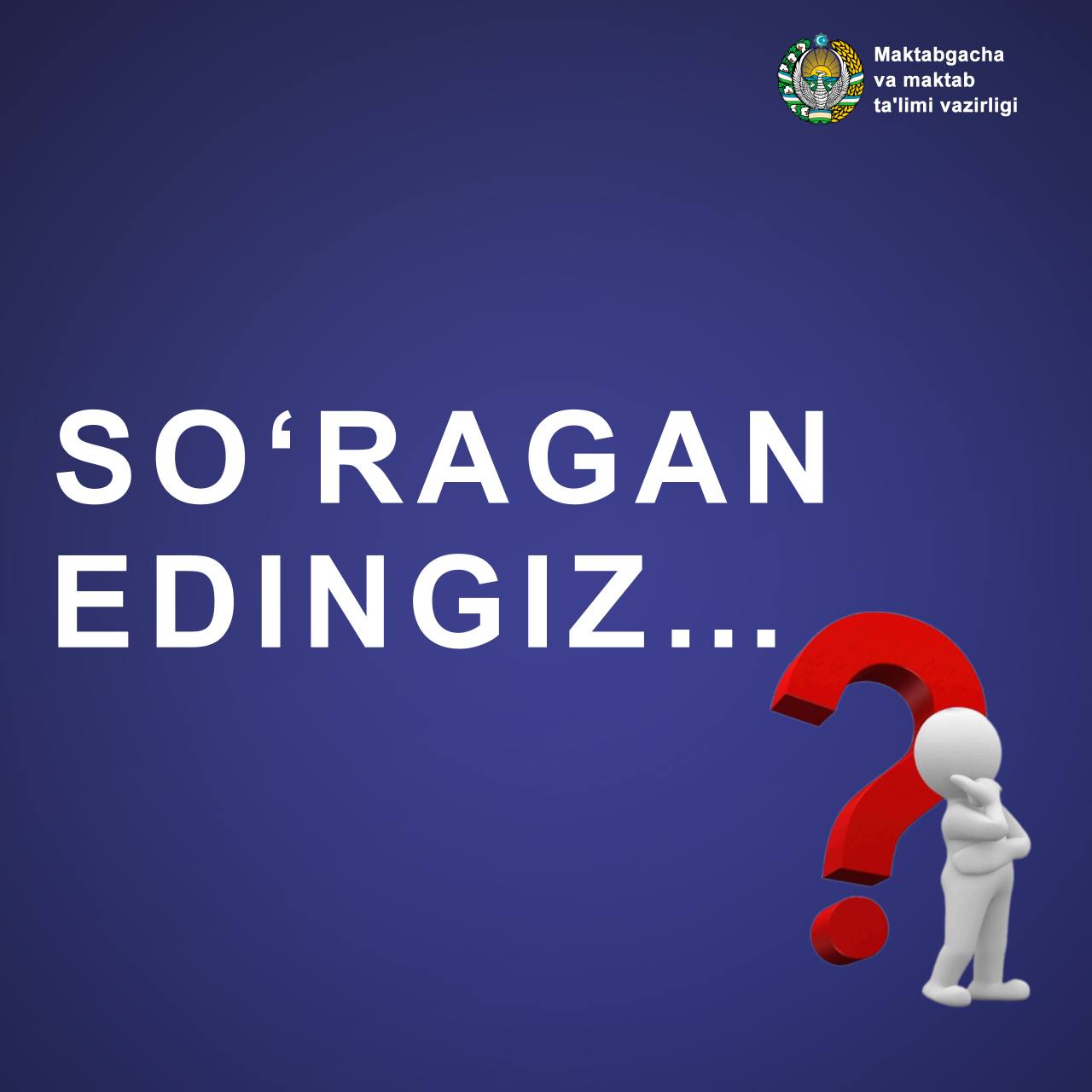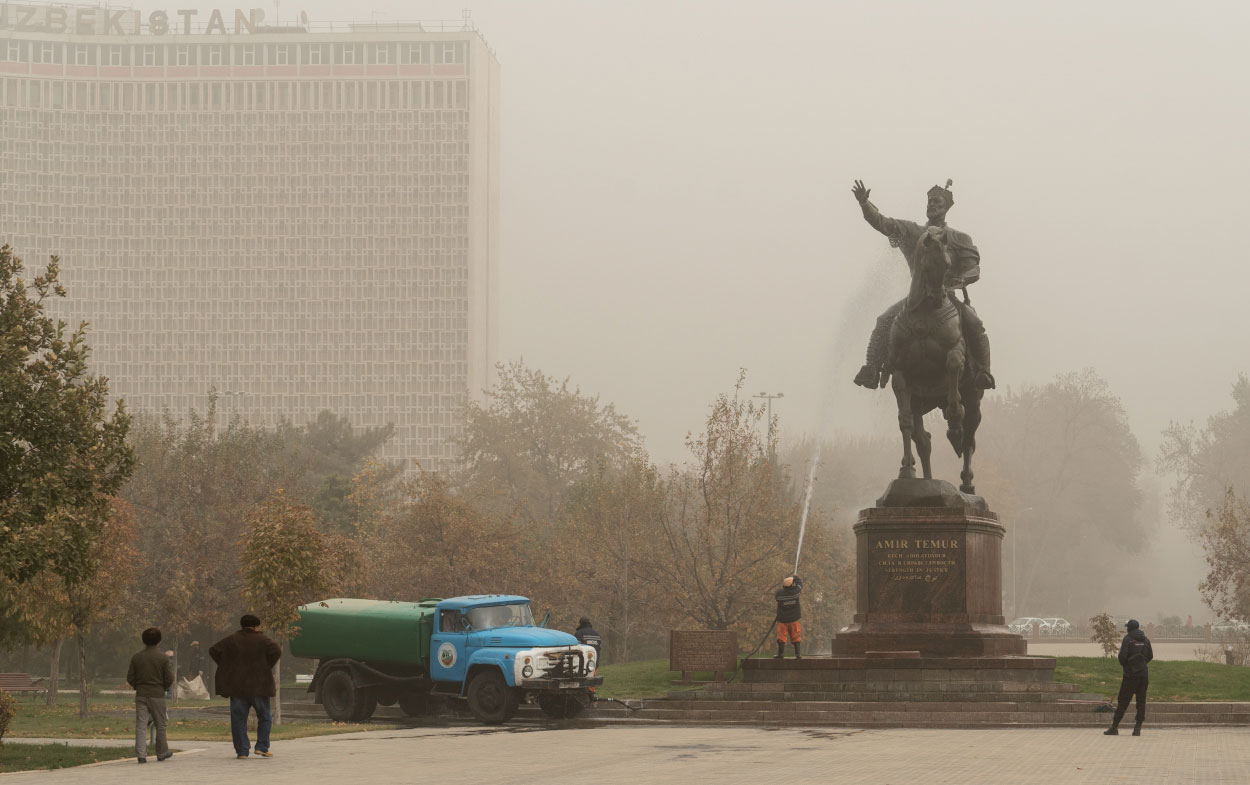LITERACY AND EDUCATION
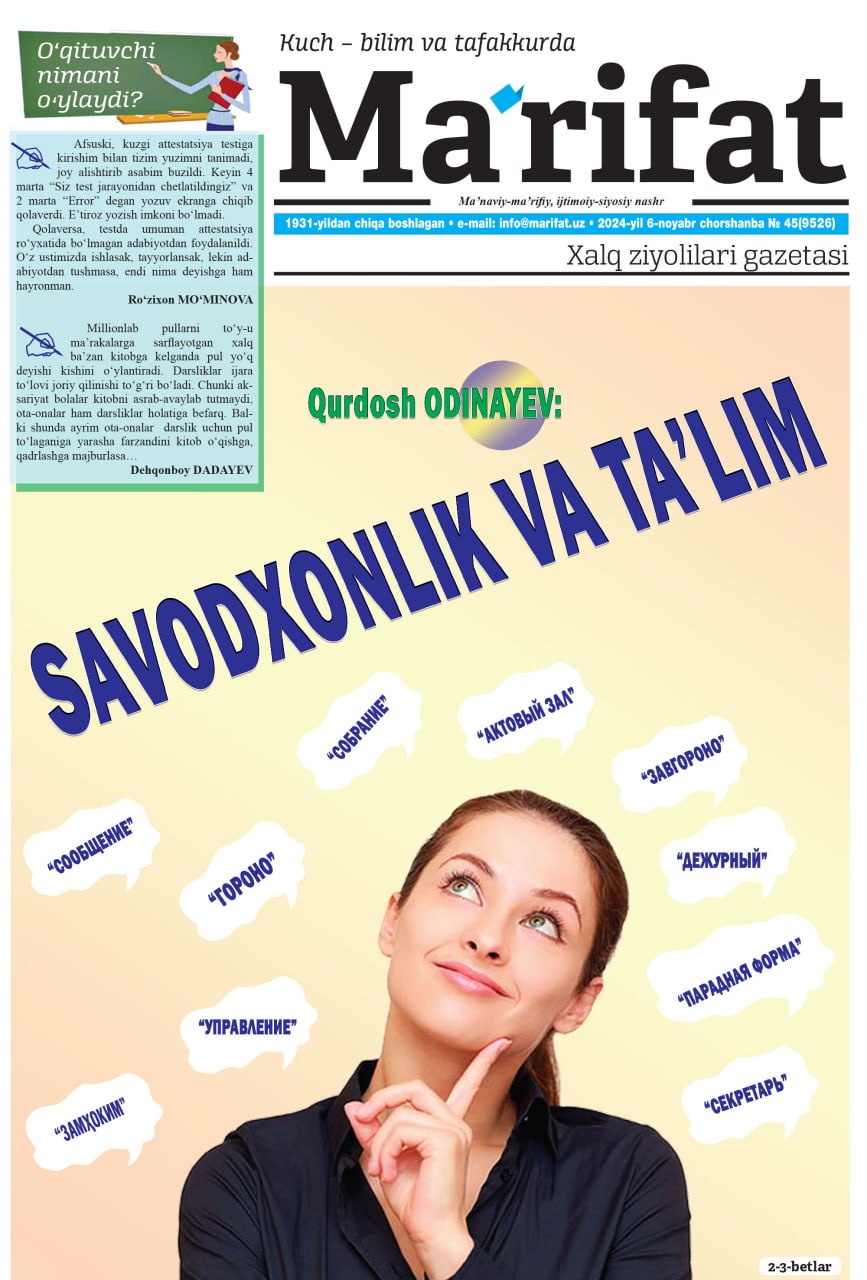
Examples of thinkers in
According to statistics, more than 50 million people in the world consider themselves Uzbek and communicate in this language. It's not a humorous number! As of 2024, there are more than 37 million people living in Uzbekistan, of which more than 31 million are Uzbeks and the rest are representatives of other nationalities. This means that more than 20 million Uzbeks live outside Uzbekistan. The right question arises about the status of the Uzbek language as the state language in the Republic of Uzbekistan, its social role and the attitude towards it at present. Recently, a message appeared on the social network that the Uzbek word "chot" comes from the Russian "schyot". One of our compatriots living in the Republic of Tajikistan proved that this word existed in the Turkic peoples before the Russians, and that the Uzbeks of Tajikistan have been using this word for a long time. If local Uzbeks in Uzbekistan do not know their native language well, cannot write correctly, communicate correctly, do not know the meaning of old, forgotten Uzbek words, how can we be an example to Uzbeks living in foreign countries? How can we say: "I am Uzbek, I live in Uzbekistan"?
The head of our state often emphasizes the motto: "Everyone should start change on their own." Adherence to the state language is bound to become from a simple worker-peasant to a responsible task of leaders of various levels! Especially in this place is the responsibility of the heads of enterprises, organizations, state institutions. Because the common people, the workers, are the example of the leaders. It is about following the simplest rules of etiquette in the Uzbek language, such as speaking the Uzbek language correctly without mistakes, spelling errors, being able to speak correctly in everyday communication without mixing words imported from foreign languages. The role of the public education system in this regard is important because the basis of education begins at the school. Teachers are also the largest part of the intelligentsia of the population. Especially the public education system has a great role in maintaining and enhancing the status of the Uzbek language. This means that in our daily work, on the street, in the crowd, we teachers are always the center of attention. Especially since 2019, a radical reform of the former preschool education, public education, higher and secondary special education systems has begun. Drastic improvement of the quality of education has been made a top priority. Performing this task entails, first of all, improving the level of knowledge and qualifications of the teacher, and consequently stimulating his work. What is the level of knowledge and level of the teacher in the Uzbek language at present? What is the level of literacy of teachers working in the education system, compliance with the rules of the state language, and the development of the Uzbek language? Unfortunately, the answers to these questions are not yes! If we look at public education workers as intelligent, spiritually leading layer of our society, it turns out how well they master their native language, write without spelling errors, observe the culture of communication, and perfectly follow the rules of the state language. If we consider these tasks on the example of management joints in general secondary education:
A great deal of responsibility falls on the Methodists of the county and city preschool and school education departments, which are the bottom limb of the system. The leadership and methodologists of the district (city) MMTB are a mirror for teachers and staff of educational institutions throughout the country. Because they supervise, guide and advise teachers and mentors, such people must first of all be wise and exemplary.
The responsibility lies with the heads of schools and their deputies! There are more than 10,000 schools under the jurisdiction of the Ministry of Preschool and School Education, about 200 non-governmental and public-private partnership schools.
There are approximately 50,000 executive support staff in schools nationwide. In schools with a large number of students and classes, there are from 1.5 to 2 full-time positions for spiritual and educational work, deputy for academic work, psychologists, which means that in practice there are even more of them. That's a great power! Let us briefly comment on the responsibilities of each of the heads and deputy assistants in schools in the observance of the state language.
In the school, all deputies are persons who report to the director by position and who follow them. This means that the director is the leader. Therefore, he must be one step ahead of his deputies in terms of morality and literacy! So, can we answer the question "yes" to the question of whether school principals in our republic can fully answer this requirement? If the director repeatedly uses various terms that have come from Russian and abroad, such as "gorono", "sobranie", "zavgorono", "zamkhokim", "task", "ruler", "upravleniya", "ministry", "paradniy form", "asset", "secretary", "tekhnichka", "dezhurniy", "smena", "zero", "gruppa", "pochernik", "dezna", "zero", "gruppa", "pocherkh", do not the deputies try to say the same in everyday communication, in meetings? Of course, it's not good to jump from leader to top, right? Most executives seem to think that the more I use the Russian word, the smarter I look. . . .
The extent to which the deputies for spiritual and educational work in schools are worthy of their post has not been analyzed over the years. If an authorized impartial organization analyzes the merits of an official in spiritual and educational work, it is clear that this indicator will be much lower...
The Deputy Director for Educational Affairs is the main person responsible for the educational process at the school. If the deputy directors of educational affairs also imitate the principal and use words such as "meeting", "call", "schedule", "class", "calendar", "signature", "circle", "report", "vacation", "mask", "glove", "chalk", these words will fall into the ears of both teachers and students. If there is no role model in the field of directors, the growth of deputies in this area will be a problem!
Another deputy director introduced in the last 4 years is the head of military conscription training, but their position remained abstract until April 2021, because they either did not receive the same salary as teachers or were not equated to other deputy directors. In practice, they worked for up to 3 years, albeit in the position of "Deputy Director of Youth Training in the Spirit of Patriotism", but with a salary even less than the leader of youth with secondary education. But their role in educating in the spirit of military-patriotism is special, because experienced men of the reserve, who worked in the field of defense, internal affairs, with higher education, came to this position. They toiled patiently, hoping that in time their wages would increase, while their patience was tested. And finally, now their salaries have been increased like those of other teachers, and the qualification category has been given. Most importantly, due to this position, the number of male teachers in schools has increased. Just judge what the character of the boys who are being educated by women should be! Military teachers make a worthy contribution to the education of students in the military-patriotic spirit. But in some schools, it is known from our experience that school principals and deputies see them as competitors in the image of the head of pre-conscription training, because they are given preference in appointment to the post of principal.
In the military sphere, both Russian and foreign terms are widely used. An urgent task of military education leaders is to find textbooks and manuals, military equipment and weapons in Uzbek and make them understandable in Uzbek. Unfortunately, to this day, the Ministry of Preschool and School Education, the Republican Educational Center does not have competent specialists who have mastered the state language in this subject. Currently, psychologists also work in secondary schools. With the introduction of psychologist staff in more than 10 thousand schools in the country, all schools have been provided with psychologists in less than 1 year. Where did so many psychologists come from all of a sudden? A legitimate question arises as to whether this is a realistic indicator or a public event that was carried out with a penchant for carrying out the plan. The fact is that the bulk of psychologists currently working in schools are non-specialists, and have not even undergone retraining. They have no choice but to conduct ready-made psychological tests! There has been no monitoring or analysis of whether these states have had an impact on the education system, or whether billions of state funds have been blown up in the air. But it is clear that the effectiveness was low. Currently, the post of inspector-psychologist has been established in schools in cooperation with the Ministry of Internal Affairs, as well as preventive inspectors. The fact that the schools were taken over by the National Guard had an impact on continuity stability. We hope that these works will not become another fruitless public event. Psychologists are mainly engaged in conducting psychological tests, but since all tests are taken from Russian and foreign languages by default, foreign terms are not used! Even in this area there are enough shortcomings in the full use of the state language.
The former secretaries of school principals – the current manager – are also responsible for the correct use of the state language. In most schools, they can only write on a computer, but there are secretaries who cannot write correctly and accurately in Uzbek and draw up work documents. The category with the highest responsibility after the above is the Uzbek language and literature subjects, primary school teachers. If there are spelling mistakes among the teachers of the Uzbek language and literature, primary school teachers – this is a negative situation for the entire education system, fortunately I hoped that there are no such teachers among us. Unfortunately, that hope of mine was dashed as well! The reason is that in July 2021, in one of the largest cities of our region (I did not cover which region and city for some reason, but the information is accurate), the Department of Public Education tested the level of teachers of the Uzbek language and literature and staff relations managers (former directors' secretaries) in the state language. The situation is deplorable! It is known that HR managers (former secretaries) have been hired in various ways, without any skill requirements. But how can one justify the inability of teachers of the Uzbek language and literature to write correctly in their native language, to form sentences correctly, not to know the rules of conducting business in the state language? Can this situation be justified? In fact, this is nothing more than a betrayal of one's language, nationality, and even state! They should avoid mixing foreign and Russian words with translations or alternatives into Uzbek, write without spelling mistakes and set an example for everyone! If they cannot meet even the simplest requirement in their specialty, it is natural that they will question how they got their higher education in the specialty of the Uzbek language and literature. An important change was the adoption of the joint resolution of the Ministry of Preschool and School Education, the Republican Center for Spirituality and Enlightenment, the Writers' Union of Uzbekistan, the Union of Journalists of Uzbekistan dated April 20, 2022 "On the introduction of the position of a promoter on creative and cultural issues in general secondary educational institutions". Introduction of the position of promoter has contributed to the emergence of creative talent in schools. Because on the basis of the decision, the attachment of talented creatives to schools led to the formation of a creative, spiritual and educational environment in the general secondary education system in a short time. It's sad that this post is coming to an end!
Finally, the category responsible for the purity of the Uzbek language at school is the teachers of all other subjects. It is unforgivable for teachers to make mistakes, use foreign words and terms that have an alternative in the Uzbek language. Because the students who learn from them will learn it too. You see, this disease is transmitted from generation to generation! If we are teachers ourselves, if we cannot speak Uzbek correctly, if we cannot pronounce correctly, if we cannot write without mistakes, what result can we expect from the students we teach? Sprinkle barley seeds and hope for wheat? Every teacher, supervisor and deputy, methodologist – each of us must have these questions in our hearts not only in the time of work, but also in everyday life and behavior! Because we are teachers, representatives of education, intellectuals, distributors of enlightenment. And we're always in the spotlight, which means we have to be incredibly considerate of ourselves! It is imperative that we work hard to get noticed! It is not for nothing that attention to language is attention to the people. Thus, the education of language culture cannot begin a student unless every schoolteacher begins it for himself. Let us not betray our native language, our nation, our state in the process of education and upbringing, as enlighteners!
Qurdosh ODINAYEV
language learning











